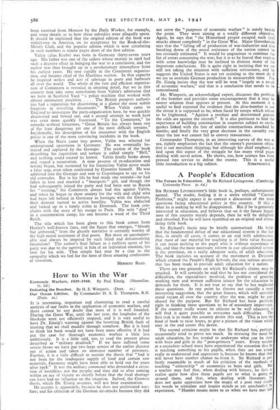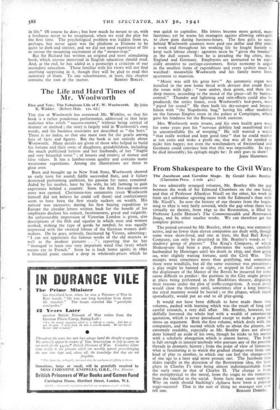A People's Education
SIR RICHARD LIVINGSTONE'S little book is, perhaps, unfortunately named. The reader, finding it in a series entitled " Current
Problems," might expect it to contain a discussion of the main questions facing educational policy in this country. If this is what he is seeking he will be disappointed. But if he is genuinely interested in education, and believes that on it the future happi- ness of this country mainly depends, then he will be delighted and absorbed. For he will have stumbled on an original and stimu- lating little book.
Sir Richard's thesis may be briefly summarised. He holds that the fundamental defect of our educational system is the fact that, in nearly all cases, it comes to an end with adolescence, that most of our material for teaching is of little value because it can mean nothing to the pupil who is without experience of life, and that the most necessary reform in our educational system is the provision, on a really adequate scale, of adult education. The book includes an account of the movement in Denmark which created the People's High Schools, the one serious attempt that has been made to provide adult education for a nation. There are two grounds on which Sir Richard's claims may be attacked. It will certainly be said that he has not considered the difficulties, the expenditure involved, the problem of granting working men and women sufficient leisure for the education he demands for them. It is not true to say that he has neglected these questions. At one point he throws out casually a most interesting suggestion, that the great houses, which will certainly stand vacant all over the country after the war, might be pur- chased for the purpose. But Sir Richard has been perfectly right in thinking these questions to be of secondary importance. If the country really wants its citizens to be well educated, it will find it quite possible to overcome such difficulties. The first task is to make the country desire this end. This is just the kind of book to raise hopes, to give a picture of the vision which may in the end create this desire.
The second criticism might be that Sir Richard has; perhaps, occasionally tried to prove too much. In stressing the need for adult education, he has tended to underrate what can be done with boys and girls in the " post-primary " years. Every teacher at a secondary school must have experienced the sensation that he is teaching something to his pupils, when they are too young really to understand and appreciate it, because he knows that they will never have another chance to. learn it. Sir Richard is per- fectly reasonable in much of his criticism of the methods of teaching " citizenship " or economics to boys and girls. But a teacher may feel that, when dealing with history, he fails to realise quite how alive these pupils are to what is going on around them, and that, when dealing with literature, be does not quite appreciate how the magic of a poet may enable his words to stimulate and inspire minds as yet unschooled by experience_ "Hamlet means more to us when we have met hint in life." Of course be does ; but how much he meant to us, with a freshness never to be recaptured, when we read the play for the first time. The psychological problem was hidden from us, perhaps, but never again was the platform at Elsinore to be quite so dark and sinister, and we did not need experience of life to savour the mounting excitement of the " mouse-trap."
But Sir Richard has written an original and most stimulating book, which anyone interested in English education should read. And, at the end, he has added as a postscript a criticism of our secondary education. Those familiar with his views will not find anything surprising in it, though they will be glad to read this summary of them. To one schoolmaster, at least, this chapter
contains the root of the matter. ROBERT BIRLEY.































 Previous page
Previous page